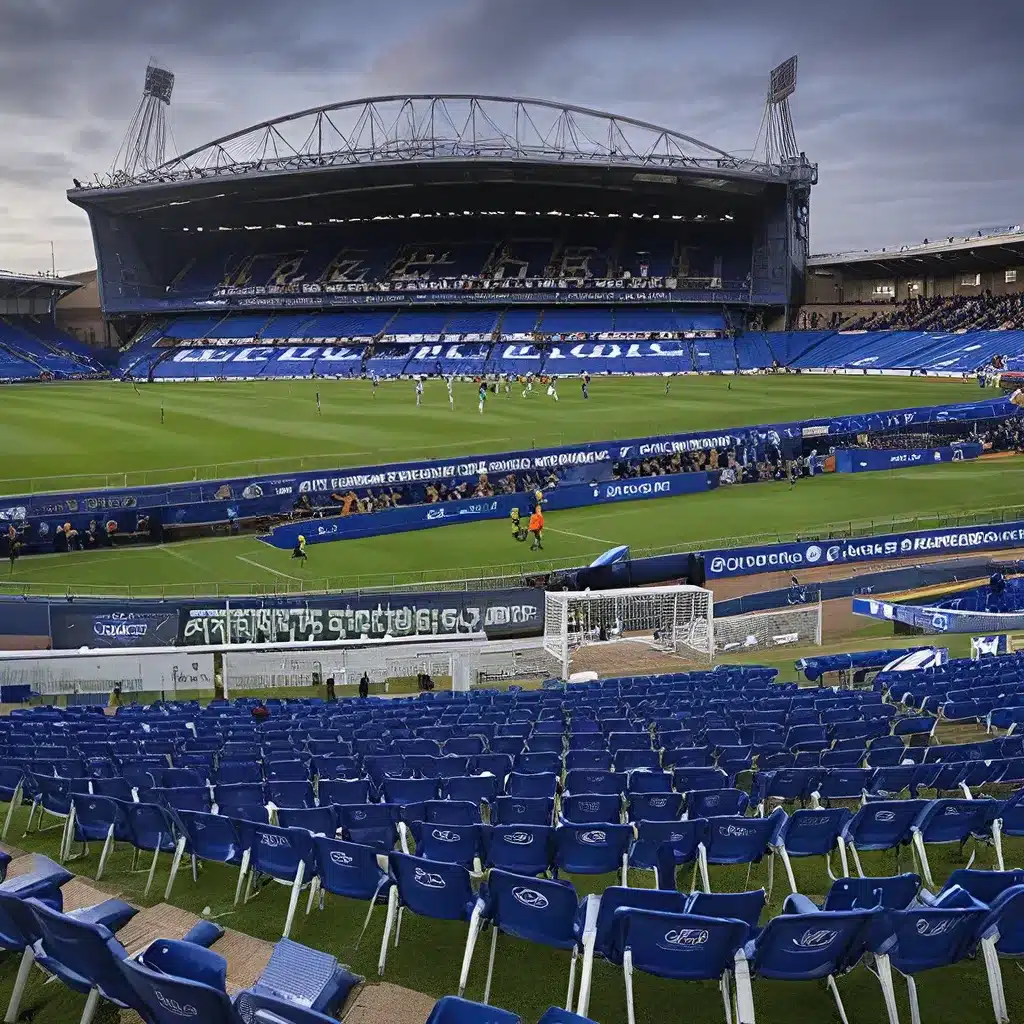
The Storied Legacy of Goodison Park
Goodison Park, the hallowed ground that has housed Everton Football Club for over a century, is a testament to the enduring passion and unwavering dedication of the Toffees’ faithful. This iconic stadium, nestled in the heart of Liverpool, has become a sanctuary for generations of supporters, where they gather to witness the team’s triumphs and commiserate their setbacks.
The stadium’s history can be traced back to 1892, when Everton, forced to vacate their previous home, Anfield, selected Goodison Park as their new permanent residence. The land, which was once a disused waste ground, was transformed into a state-of-the-art facility, designed by the renowned architect, Archibald Leitch. With its imposing stands and carefully crafted terraces, Goodison Park quickly established itself as one of the most iconic venues in the burgeoning world of English football.
Over the decades, Goodison Park has borne witness to countless memorable moments, from the exhilarating goals that have thrilled the Everton faithful to the heart-wrenching defeats that have left them dejected. The stadium’s hallowed turf has been graced by some of the game’s greatest players, including the legendary Dixie Dean, whose prolific goalscoring exploits have become the stuff of Merseyside folklore.
The Architectural Charm of Goodison Park
One of the defining features of Goodison Park is its architectural charm. The stadium’s distinct red-brick facades and imposing, angular stands evoke a bygone era of British football, a time when the sport was steeped in tradition and community. The iconic Archibald Leitch design, which has been replicated in various forms across the country, is a testament to the enduring appeal of classic stadium architecture.
Stepping inside Goodison Park, visitors are immediately struck by the stadium’s immersive atmosphere. The steep terraces and close proximity of the fans to the pitch create a unique sense of intimacy, where the roar of the crowd seems to reverberate through the very fabric of the stadium. This proximity between supporters and players has been a cornerstone of Everton’s identity, fostering a deep connection between the team and its loyal fan base.
Beyond the architectural elements, Goodison Park boasts a range of amenities that cater to the modern-day match-going experience. From state-of-the-art hospitality suites to well-equipped concession stands, the stadium has evolved to meet the evolving needs of its supporters, while still preserving its timeless character.
Everton’s Enduring Spirit and the Importance of Goodison Park
At the heart of Goodison Park’s significance lies the unwavering spirit of Everton Football Club. As one of the founding members of the Football League, the Toffees have a rich history steeped in tradition and success, with a passionate fan base that has remained steadfast through the club’s triumphs and tribulations.
Goodison Park has become a symbol of this enduring spirit, a place where the club’s identity and the supporters’ devotion converge. The stadium’s hallowed turf has witnessed the rise of iconic Everton players, from the legendary Dixie Dean to modern-day heroes like Tim Cahill and Leighton Baines. Each generation of Everton fans has forged a deep, emotional connection with the stadium, imbuing it with a sense of reverence and belonging that transcends the boundaries of the pitch.
The importance of Goodison Park to the Everton community cannot be overstated. The stadium has served as a gathering place, a shared experience that has brought together generations of supporters, fostering a sense of unity and camaraderie that is unique to the Toffees’ faithful. From the pre-match rituals to the post-match celebrations, Goodison Park has become a sacred space where the club’s history, identity, and the unwavering devotion of its supporters converge.
The Challenges and Opportunities Ahead
As Everton Football Club looks to the future, the fate of Goodison Park has become a topic of intense discussion and debate. The club’s plans to relocate to a new, state-of-the-art stadium have sparked a range of emotions among the supporters, with many grappling with the prospect of leaving behind the cherished grounds that have been their home for over a century.
However, the challenges facing Goodison Park are undeniable. The stadium’s aging infrastructure and the need to modernize the match-day experience have become pressing concerns, forcing the club to carefully weigh the pros and cons of a potential move. Proponents of the relocation argue that a new stadium would provide the necessary resources and amenities to elevate the club’s status and competitiveness, while also offering a more comfortable and accessible experience for supporters.
Amidst this debate, the emotional attachment to Goodison Park remains a powerful force. Many fans have expressed a deep sense of nostalgia and a desire to preserve the stadium’s historic character and the unique atmosphere it has fostered over the decades. The club’s leadership has acknowledged this sentiment, and has pledged to find a way to honor the legacy of Goodison Park, even as they explore the possibility of a move.
Conclusion: Embracing the Future while Honoring the Past
As Everton Football Club navigates the challenging decisions that lie ahead, the role of Goodison Park in the club’s identity and the lives of its supporters will continue to be a central point of discussion. Whether the team ultimately chooses to remain at their historic home or embark on a new chapter in a different stadium, the legacy of Goodison Park will undoubtedly endure, serving as a testament to the unbreakable bond between the Toffees and their cherished abode.
The future of Everton may be uncertain, but one thing is clear: Goodison Park will forever hold a special place in the hearts of the Everton faithful, a timeless symbol of the club’s unwavering spirit and the enduring passion of the supporters who have made it their own.

